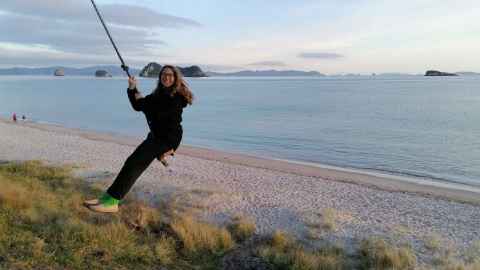Take 10 with... Eleanor Kennedy
Dr Eleanor Kennedy explains her MRI - focused research into early brain development and how it relates to behaviour in childhood.

1. Describe your research topic to us in 10 words or less.
How perinatal factors affect brain development and the relationship to behaviour in childhood.
2. Now describe it in everyday terms!
I look at how the things that happen really early in life (during pregnancy, in newborn babies, or really early in a baby’s life) affect brain development and the brain. I also look at how these factors affect behaviour, and how the brain and behaviour are linked together.
3. What are some of the day-to-day research activities you carry out?
I work with MRI so I do a fair bit of data processing, including the analysis of data from MRI projects that completed before I got here. I do a lot of writing – I’ve submitted about six grants this year, as well as writing ethics to get new studies done, and writing up studies to get them published. I also supervise a student and help with the coordination of some of the baby studies we’ve got going on.
4. What do you enjoy most about your research?
I enjoy how varied and challenging my job is. I’m still learning loads of neonatal…everything! and I enjoy that and the fact that it’s linked with medicine. My background is psychology and research psychology and I enjoy the fact that the job here is really applied – it’s clinical work that could make a difference. It’s been thought up by neonatologists and dietitians who’ve discovered a real problem that needs to be solved and I really like that.
5. Tell us something that has surprised or amused you in the course of your research.
One day I found a picture of a salmon in amongst our data! The computer was running through loads of files and paused at one called salmon.zip. I opened it thinking someone maybe had the second name ‘Salmon’ but no, it was an MRI of a fish. I think it was data that got put in accidentally but it really amused me.
6. How have you approached any challenges you’ve faced in your research?
With determination! I can work very independently and although getting help usually helps, it takes me a while to get to that stage.
7. What questions have emerged as a result?
In the MR DIAMOND Study we are looking at how different nutritional approaches (tested in the main DIAMOND clinical trial) affect really early brain development, and we’ve had a lot of unexpected findings. These are called incidental findings and relate to things you discover that may be clinically relevant but that you weren’t actually looking for. The babies in the DIAMOND Study are moderate to late preterm and they’re not usually scanned at all in clinical practice. When they’re scanned in research it usually at term equivalent age, whereas we’re scanning them much younger. This has opened up questions around how common some of things we’ve found are, and what long-term implications they have for the child’s development. That’s why we’ve started the MoPED Study, which stands for ‘Moderate to Late Preterm Babies Early Brain Development’.
8. What impact is your research having or what impact do you hope it will have?
I hope it’ll help us to understand more about the health of preterm babies in particular. The grand aim with MRI studies is usually to be able to use it as a diagnostic tool for a lot of things, and if you can help to see which babies are more at risk of something early on then you can give them and their families the support and help they need, which makes a big difference to their lifelong health.
9. If you collaborate across the University, or outside the University, who do you work with and how does it benefit your research?
We collaborate with the team at the Hospital for Sick Kids in Toronto who are really experience in neonatal neuro-imaging, so it’s really good to have their input on things. Sometimes the professor there will just tell you interesting clinical stories which is often a much better way to learn than sitting down and reading ten papers. We also collaborate with researchers at the Centre for Brain Research, which is great for me as there’s not many people working on MRI at Liggins. It’s helpful to have people in the faculties who use similar techniques to you.
10. What one piece of advice would you give your younger, less experienced research self?
Ask for help more. But it’s advice I still have to remind myself of now!